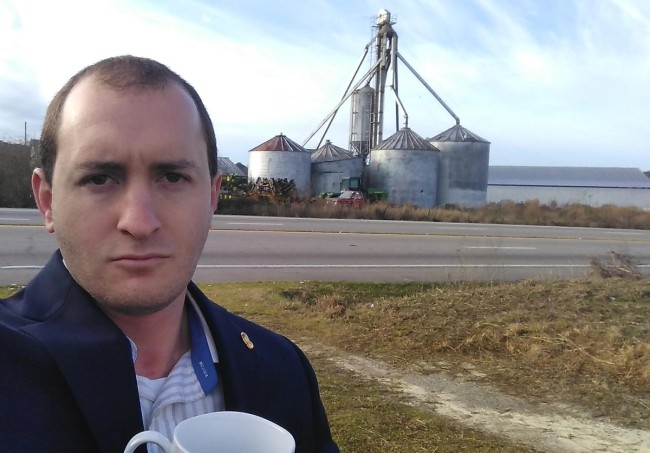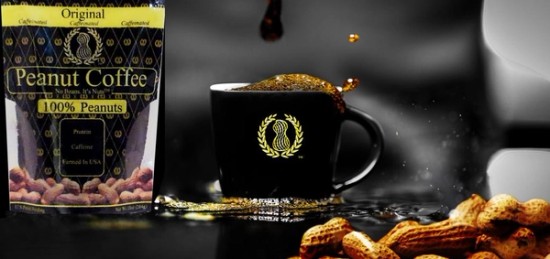If getting your day started is dependent upon getting your morning cup of coffee you’re not alone. Humans have been brewing the stuff from the ground-up seeds of the Coffea plant for over 500 years, and our obsession with it has only increased over time. Approximately 64% of Americans say that they have a cup of joe every day.
For most of us, that daily dose is a source of caffeine to keep us alert and energized. But for peanut farmer James Harrell, it is a source of inspiration. Harrell is a fifth-generation peanut farmer in Suffolk, Virginia. His family farm is situated in an area that was once dubbed the peanut capital. Today it is, coincidentally, self-described as the “caffeine capital” thanks to the large number of prominent coffee roasting companies based there.
While peanuts and coffee are both technically roasted beans, their similarities have traditionally ended there. That is until Harrell patented the process for the world’s first coffee made entirely from peanuts grown in the United States.
Virginia Gold Peanut Coffee consists of deeply roasted and ground Virginia-type peanuts sourced from Harrell’s farm. When steeped with hot water it yields a product that tastes very much like regular coffee.

James Harrell, Founder of Virginia Gold Peanut Coffee
We sat down with James Harrell to find out more about this innovative new product, what inspired him to invent it, and how he’s convincing consumers to start their day with a cup of peanut coffee.
NPB: What inspired you to start making coffee from peanuts?
Harrell: If you've never been to Suffolk, we are actually being called the caffeine capital because you have a lot of coffee roasting facilities here in the industrial parks. You can smell the coffee roasting for miles. Right before peanut harvest, I was drinking a cup of coffee and smelling the coffee. And I thought, why can't you turn peanuts into something that resembles coffee? And I tried doing it. The thought of a new market opportunity for peanuts was largely the deciding factor which spurred me to start the business.
NPB: How do you make it and what were some of the challenges in creating peanut coffee?
Harrell: I was cooking these peanuts on a cookie sheet in my home in the oven, like five pounds at a time. It took a long time to get a small amount. And then I ran into a lot of problems. You have the problem of extracting the oil from the peanut, and that's the problem I ran into. With the equipment on the market today, it's relatively difficult to remove the oil from a super roasted peanut that's roasted like coffee. We've actually found out how to remove the oil at a certain extraction rate from the peanuts that have been roasted the way we roast them. Basically, we take peanuts, roast them like coffee beans, and separate the protein from the fat. It is much easier said than done. I even had to build some of my own equipment. Many parts of the process to make our products are closely guarded trade secrets which aren’t shared with anyone. Our process and trade secrets are known only by me and they are locked in a safety deposit box in a Suffolk bank.
NPB: Are you also selling the roasted peanut oil that’s separated from the peanut coffee?
Harrell: Yes, it's actually a really new product to us. We never really thought to bottle the byproduct of peanut coffee until my father mentioned it. Nobody likes to waste anything. So, we started to bottle that last year. It's used as a finishing oil or a garnish. It's something you add to food to give it extra flavor.
NPB: What are some of the benefits of peanut coffee?
Harrell: You have the added benefit of the natural protein in peanuts. Also, there's no acid in peanuts. The caffeine-free peanut coffee is non-acidic. Because there's no acid in it, that's why it's really smooth. We actually get people to try this at farmers markets and trade shows, and they tell us, "Wow, I always put cream and sugar in my coffee. But I can drink this black." Many people cannot have the caffeine in coffee, or even the small amount of caffeine in decaf. We call our product “caffeine-free” and not “decaf” because our product is 100% naturally caffeine-free. We do add caffeine for a caffeinated version of peanut coffee. The caffeine we add is extracted from coffee during the process of making decaffeinated coffee. Consumers can now have a caffeinated coffee-tasting product, while also knowing the product they are drinking was farmed in the United States. Peanut coffee is a value-added product to the peanut industry.
NPB: What are some of the challenges and opportunities for convincing consumers to try and buy peanut coffee?
Harrell: When we started, people thought it was a peanut-flavored coffee. It's really difficult to educate the consumer because they've just never seen it before. But the whole objective is to get this peanut coffee product to taste just like coffee. A lot of people ask us, "Why do you call it coffee?" And they'll try it, and they'll drink it. And they say, "Oh. Well, now I understand. It tastes just like coffee." The vast majority of our return customers are buying the caffeine-free product. They say it is the best tasting coffee alternative on the market today. With our caffeine-free peanut coffee, they don’t have to sacrifice flavor for drinking an American-grown coffee alternative.
You can purchase Virginia Gold Peanut Coffee and Roasted Peanut Oil at VaGold.com.
